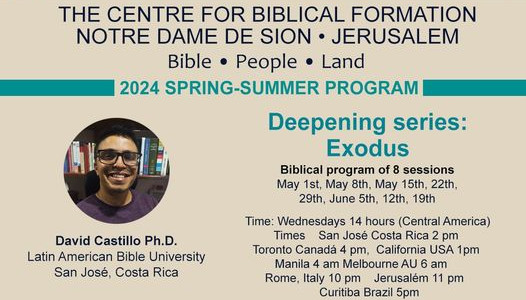Exodus
01/05/2024 | Na stronie od 16/02/2024

Source: Notre Dame de Sion
Program Description
Journeying with God into the desert: justice, hope and solidarity in the Exodus narrative. Why to read the Book of Exodus today? What is its relevance or importance for believers and non-believers in our current context? The story of the Exodus is one of the most representatives of biblical material. Within the Hebrew and Christian canons, some of the Exodus traditions represent the oldest texts that can be found in our Bibles, and in terms of its reception, the story of Moses and the liberation of Egypt is part of elaborations and re-elaborations in books like 1 Samuel, 2 Kings, Amos, Ezra-Nehemiah, Matthew, and Revelation, to name only some of them. Our current cultures have also been shaped by this tradition. Films and movies, paintings, songs and poems belonging to Eastern and Western cultures have been inspired by the different narratives in the book, and also important legislation of countries, related to robbery or murder find echoes in the Ten Commandments found in Exodus.
Additionally, current biblical hermeneutical trends of liberation have been motivated by the Exodus narrative, this in order to claim for a more just world in the midst of realities of exploitation and violence. These few examples invite us to examine the current value of this book for experts and believers today. This program intends to construct an immersive experience, which, beginning with a journey to the desert itself, studies and reflects on the most characteristic sections of the book. The approach will invite participants to explore the literary level of the text, where the story tells about the amazing liberation of a group of Hebrew slaves from the bondage of one of the most important empires in ancient history: Egypt. The literary level will make us think of the way literature becomes an instrument to shape identity and express religious experience.
Secondly, the course will interrogate the historical dimension of the text, dealing with the common questions that are addressed to this book: Did the Exodus occur as it is narrated in the Bible? Did God divide the Red Sea (was it the Red Sea?) so the Israelites could escape from pharaoh’s chariots? Did God send manna from heaven? Archaeology and historiography of Ancient Israel has responded to these and other similar questions with a wide variety. For some scholars, the text could be historically trusted in most of its content, while for others it is a nationalistic story told in a more recent time –under the kingdom of Josiah – when the people of Judah had territorial disputes with the southern neighbour of Egypt. The program will allow us to explore the different answers to these questions, and to deepen in the historical relevance of the Exodus event for religious experience.
Finally, the program will interrogate the religious richness of the Exodus for ancient and current readers. The experience of Egypt was called a life in the “iron-smelting furnace” by legislators in the Book of Deuteronomy (4.20), this being a metaphoric way to invite Israelites to not oppress foreigners in their land. Amos 9.7 reminds of the liberation from Egypt to emphasize that God liberated Israel as He liberated the Philistines, and Matthew tells the story of Jesus birth in an away that is reminiscent of Moses, announcing a new liberating intervention of God in history. Exodus has been labelled as a book of liberation, of justice and hope, as well as a denunciation against oppression. Has this book any word to say to believers and non-believers today, and for biblical students who seek for religious inspiration in the biblical text to construct a better world? This and other similar questions will be explored in our Exodus program.
David Castillo, Ph.D.
I am Costa Rican, from a Protestant background. Through my studies and work, I have had an ecumenical experience within different Christian movements. I currently work as part of the Bible team at the Center for Judeo-Christian Studies and Relations of the Nuestra Señora de Sion congregation in San José, Costa Rica. There I am in charge of biblical formation and administrative tasks. Additionally, I work part-time at the Latin American Bible University in San José, Costa Rica, as a Bible professor. I recently completed doctoral studies in the Old Testament area at the University of KwaZulu-Natal, in South Africa, where I had also completed a Master's Degree. I am a graduate in the area of Biblical Studies from the Latin American Biblical University, and graduated with an Academic Master's Degree in Sociology from the University of Costa Rica.